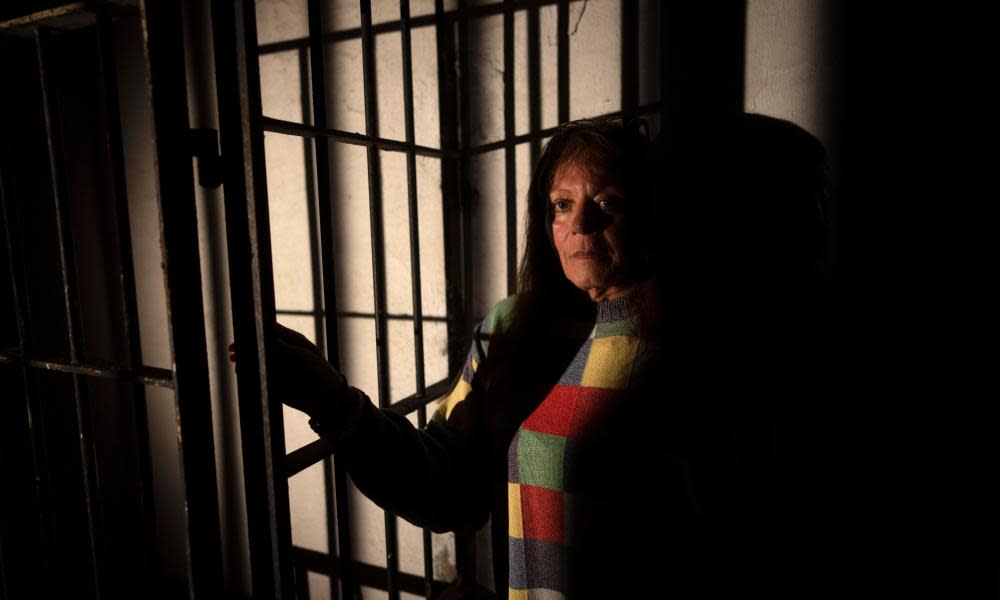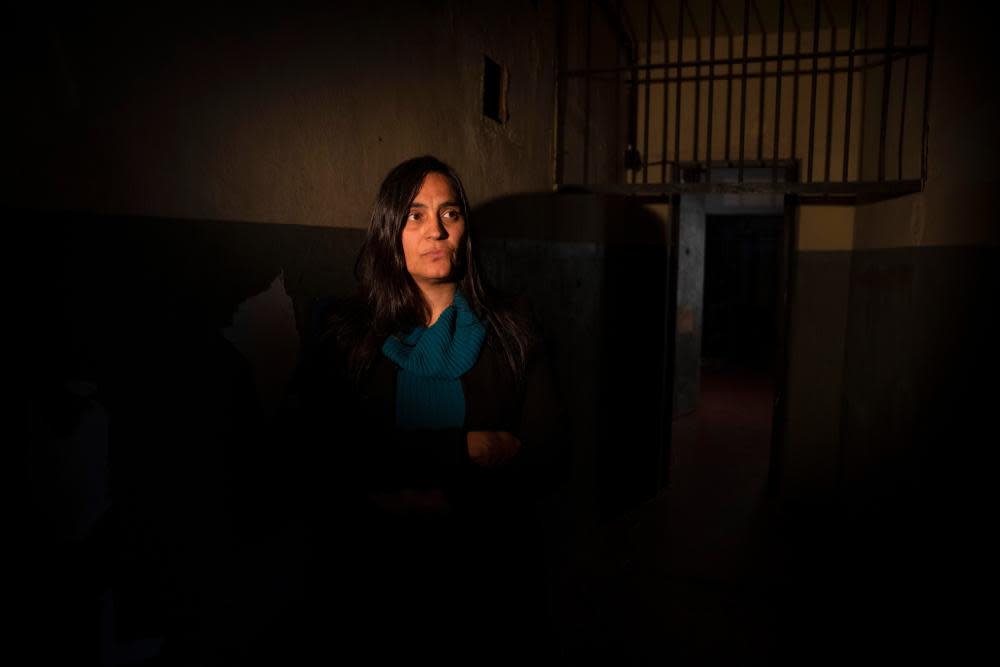‘It was hell’: trans women testify on Argentina’s secret prisons of the past

Julieta González could tell the military officers were coming by the crunch of their footsteps. The building where she was held spoke to her through guttural screams, flickering lights and the thud of boots.
“Where are we?” a voice called out to her one day, as she was moved from one part of the building to another. “Banfield”, she yelled back.
González was 19 or 20 then. She is 65 now, and far from the horrors of a place known as el Pozo de Banfield – the Banfield Pit: one of the largest clandestine detention centers run by Argentina’s 1976 to 1983 military dictatorship.
During that period of military rule, as many as 30,000 people were murdered or forcibly disappeared; hundreds are believed to have passed through the Banfield Pit.
Argentina has long grappled with its violent past, with more than 1,000 former military, police and civilians prosecuted and sentenced for crimes against humanity. But decades after the return of democracy, new details of dictatorship atrocities are still coming to light.
González’s story represents one of those missing pieces. She was among a group of five trans women who testified at a trial over crimes committed at secret prisons, marking the first time trans women persecuted during the dictatorship were given their day in court in Argentina.
Related: How an Argentinian man learned his ‘father’ may have killed his real parents
They formed part of a large case that began in 2020 and is prosecuting crimes against humanity committed at three clandestine detention and torture centers, among them the Banfield Pit, which also acted as a clandestine maternity ward, where newborns were taken from their captive mothers and raised by other families.
The case involves 442 victims, and 16 accused, three of whom have died since being charged. Closing arguments are slated for this month.
“It was hell, what we lived through in there,” said Paola Alagastino, another witness. “They did what they wanted with us. It wasn’t sex, it was rape,” she said.
Guards would single out the trans women for particular torment, she said, recalling how they would tell her: “Fag, you have to die. You’re not worth anything, we’re going to kill you, and we’re going to toss you away and no one is going to find you.”
Carla Fabiana Guttierez, another trans witness, said: “They treated us like animals, because that’s what we were for them.”
Their testimony fills an important gap in Argentina’s ongoing efforts to deliver justice – at a time when the collective understanding of the crimes of the dictatorship has come under threat with the rise of the far-right presidential candidate Javier Milei.
The 53-year-old economist who has surged in popularity, with incendiary attacks on the political establishment, has also stoked denialist rhetoric that minimized the actions of the military junta as “excesses”, rather than “state terrorism”, as courts have found.
Many of the victims of the dictatorship were targeted for their political views, often accused of belonging to militant guerrillas. But the crackdown went much further, sweeping up union organizers, student activists, clergy, journalists and people searching for relatives who had been disappeared.

“The state terrorism was an attempt to impose a certain model [of society],” said Ana Oberlin, a federal prosecutor.
That model was of a Catholic, heterosexual society composed of “obedient citizens”, and built around family and work, testified Marlene Wayar, a trans activist, writer and social psychologist. “We understand sexual dissidence in the practice of prostitution as a threat to national, Christian, family thinking,” she said.
Anti-trans violence was not new, but the dictatorship brought “an intensification” of the violence and oppression that trans women knew all too well, said Oberlin. The fact that many trans women worked in the sex trade made it “easier to hunt them down”, Oberlin argued.
Oberlin said that the state terror was “part of the violence that has to do with constantly discriminating and separating people who are outside of the heteronormativity, as if they were part of another world”.
When she started tracking down the survivors, she found many had long wanted to tell their stories, but didn’t think the courts would listen.
Related: Argentina’s far-right frontrunner reopens wounds of dictatorship
“We have never had the right to truth, to justice, to memory and to feel that our bodies matter,” said Wayar. “This moment, this trial, is extremely significant.”
Valeria del Mar Ramírez was the first trans person to testify at the same trial last year. She was 20 years old and working the sex trade when she was picked up and thrown into the Banfield Pit.
“What can I tell you, it was the worst thing a human could live through,” she said.
Del Mar Ramírez and a friend were held in “mailboxes” – long cells that had openings through which they would receive food – and forced to perform oral sex in order to eat. The perpetrators were high-ranking officials, she said. “I’m 66 years old now, but those scars never heal.”
After 14 days, she was freed after a lawyer filed a writ of habeas corpus.
Upon her release, she asked a police officer about her friend, and received an ominous warning. “Don’t ask, and give thanks that you’re out,” she recalled.
Sitting on a bench next to the river in Tigre, a municipality north of Buenos Aires, she could still remember the prison with photographic clarity: the blood-soaked cars they were forced to clean, the look of suffering she saw in the face of a young woman, huddled in a corner of a cell.
“We heard screams from young people, men and women. When they shouted, the lights went up and down. And a radio was playing very loudly,” she said.
She and her three friends survived off the scraps they could steal from the meals they were forced to cook for the officers.
One day, they heard a string of screams in bursts, and then a baby’s wail. And after that, silence.
“That has stayed with me,” she said. “I’ve always thought about that girl that I saw. What became of her, why did they take her there, what did they do to her?”
And she has thought about the baby, too. She hopes that one day, she may be able to tell that child she was there at their birth.
“We didn’t understand the gravity of what was happening around us,” she said. “I’ve been talking about this for years. But no one ever listened to us before.”


